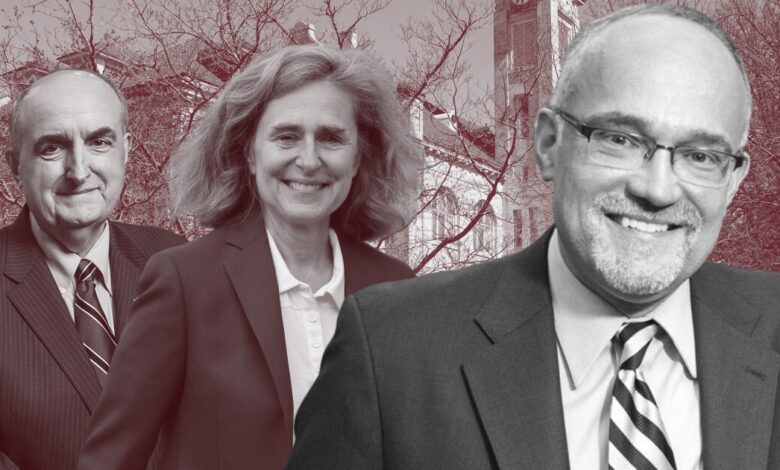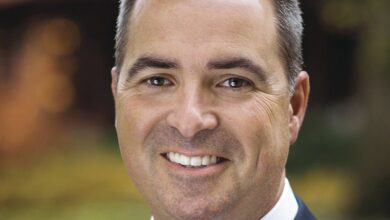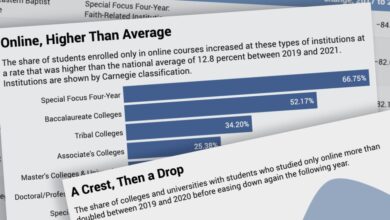This Professor Investigated a Presidential Search at His University. It Said He Was Out of Line.

When you’re in the mix, people tell you things. Immediately after IU announced Pamela Whitten last spring as its next president, rumors “started flying” that the search process had contained some “oddities,” Sanders told The Chronicle in an interview. He was interested. So he dug deeper.
Eventually he published an article on Medium about what he’d learned. He described a “tortuous” search that demonstrated “the problems of secrecy, and a Board of Trustees unaccustomed to working in a shared-governance process.” He pointed to documents showing the board had agreed to new compensation for the departing president behind closed doors.
He acknowledged that he was friends with an internal candidate, who had not been chosen, but made the case that his investigation had a legitimate public interest: “Critically examining the workings of an important public institution, so that the members of its community can then discuss and draw lessons, is valuable in its own right.”
Publicly, IU said little. In correspondence, its general counsel expressed irritation at Sanders’s conduct, saying that the professor had violated university policy by publishing what he did, and wasn’t “the crusader for public transparency that he hails himself to be.” And someone filed a public-records request to see Sanders’s emails, presumably to figure out how he knew what he knew.
The case reveals a wide gap between a faculty member’s notion of what he can probe and publicize, and the university’s much narrower idea. Administrators may want criticisms and unflattering information to be kept in house. But that’s miles away from how professors conceive their rights, and their purpose, under the principles of academic freedom.
Sanders made no secret of his objection to the decision, telling local reporters that Kennesaw State did not have the research profile or the prestige of Indiana and that he would have preferred an internal candidate to an external one. He also said the process should have been more transparent. The search was closed, and Sanders would learn that members of the presidential-search committee had been required to sign nondisclosure agreements. Bolstered by rumors of something amiss, he said, Sanders started talking with some of the people involved. He envisioned writing a journalistic account of what had happened that would “in part be a cautionary tale.” He eventually spoke with eight people (whom he didn’t name), who had “directly participated, in various capacities, in the process that culminated in Whitten’s appointment,” and had conversations with “several other knowledgeable people,” according to his article. He also obtained, through a public-records request, several documents related to the search, which he posted online.
Last year an 18-member presidential-search committee, appointed by trustees and including several trustees among its members, sorted through the candidates. It eventually chose four finalists — one internal and three external, according to Sanders’s article. But instead of hiring one of those candidates, the board in February presented the committee with a list of “approximately four” new people, including Whitten, to interview. “Why none of the search committee’s finalists was chosen is a central question in this narrative, but only the trustees know the answers,” Sanders wrote. “Nothing here suggests bad motives. But what dynamics were in play?”
In March the board negotiated an agreement with McRobbie to delay his scheduled sabbatical and stay on the job for another six months. By that point, the trustees were “nervous the search might end in failure or need to be extended,” Sanders wrote. McRobbie and Michael J. Mirro, then chair of the board, signed an addendum to his existing contract that included, among other things, a retention bonus. The board scheduled a public meeting to vote on the contract extension, then canceled it. By then, Whitten presumably had emerged as the choice.
But the board decided to pay McRobbie anyway — about $582,700, which included his base presidential salary, a bonus, and deferred compensation — and to change what the payment was for. Now, according to a May letter to McRobbie signed by Mirro and the board’s then vice chair, he’d be paid the same amount, not for continuing as president but for consulting services to the new president, to be provided when requested by Whitten.
One board member, James T. Morris, who was then chair of the board’s compensation committee, had told his fellow trustees in a May letter that McRobbie “had a reasonable expectation that the signed contract was valid, and he advises us that he therefore delayed his sabbatical opportunities at two institutions by one semester.” (Under his original presidential contract, McRobbie was to be given a yearlong sabbatical when he left office, during which he’d be paid his presidential salary to provide “strategic advice and counsel to the trustees on changes and developments in higher education.”)
Paying McRobbie would “uphold the integrity of the board’s commitments to Michael” and would also “assure that when the chair of the board [Mirro] acts on behalf of the trustees, those commitments are honored,” Morris wrote.
Views may differ on the wisdom of paying McRobbie that money, Sanders wrote. “Some people have reacted to me that this is just how things are done in the business world; McRobbie was a great success, and the money pales in comparison to the amounts IU routinely spends to buy out failed coaches. Others have observed that it’s still a lot of money to the average person, or even faculty member.”
To James H. Finkelstein, a professor emeritus of public policy at George Mason University who researches presidential contracts and compensation, and has written about it for The Chronicle, the compensation for consulting raises all sorts of questions. A “dirty little secret” of presidential transitions is that most new presidents would prefer that their predecessors not be around when they take office, Finkelstein said. That’s one reason boards grant sabbaticals to departing presidents who plan to return to the faculty — to allow the newcomers to establish “their own identity.” Depending on how much consulting Whitten wanted, it “could be a lot of work … or it could be no work” for McRobbie, Finkelstein said.
“It sounds like he’s going to remain an employee, but he doesn’t have to do anything at all unless he’s requested,” Finkelstein said. “So this just isn’t the way that normal business is done.”
Most significant, Sanders contends, the McRobbie agreement was never publicly discussed or approved — a violation of the state’s Open Door Law. “Maybe it’s good for the university’s public image and support to keep anything controversial out of public view,” Sanders wrote. “But the point of the open-meetings law is to assure public knowledge and accountability.” (The university has disputed the professor’s argument, as will be described below.)
Ultimately, his article concludes, “it is unhealthy for an important public institution to operate in an environment where there is little independent and informed scrutiny … I have attempted to remedy a small part of that problem here.”
The Chronicle reached out to all members of the search committee and to all trustees to vet Sanders’s account. The search-committee members who replied declined to comment. Most trustees did not respond. A spokesman for the university said it would not comment further on the search “beyond the fact that Pamela Whitten was unanimously and enthusiastically chosen by IU’s Board of Trustees.” Whitten did not respond to an interview request.
Harry L. Gonso, a trustee, said during a brief phone call that Whitten was “hitting the ground running” and that the board was very pleased with its choice. Criticism of her academic credentials and work experience are “very disruptive” distractions, he said. When a Chronicle reporter said that Sanders’s article seemed to be criticizing the process rather than the final choice, and asked if that distinction made sense, Gonso replied that it did not.
The request seemed designed to figure out how Sanders had learned what he knew. Evan Carr, a lawyer at Hoover Hull Turner LLP, wanted communications related to the presidential search or contractual matters between IU and McRobbie. (Carr — who later expanded the request to include other IU officials — did not respond to The Chronicle’s efforts to reach him by phone and text.)
Sanders wondered if the university, or someone affiliated with the university, was behind the request. Carr had asked for emails sent from August 1 to September 16. During that period, Sanders had been asking IU officials for comment on his findings. And Hoover Hull Turner is representing Indiana trustees along with several defendants at the university in an unrelated lawsuit.
Sanders asked Jacqueline Simmons, vice president and general counsel at IU, if the university was involved in the request. When she didn’t respond after a few hours, he reached out to her again. No response. He wrote up the circumstantial evidence in a draft article with the headline “I’ve been looking into IU’s presidential search. Now a law firm is demanding to snoop through my email.” — and sent it to communications-staff members at IU, asking for comment or clarification. No response. So he published it.
“Who could be behind this?” Sanders wrote. “If it is IU, it would be a stunning attempt to chill a faculty member’s First Amendment rights and intimidate him into keeping silent about things the university knows will be controversial.”
Sanders’s two articles set off alarm bells for Indiana faculty members and higher-ed observers elsewhere. The Bloomington campus’s chapter of the American Association of University Professors outlined its position in two statements. The professor had brought forth “serious and credible allegations” that the presidential-search process was flawed. And because IU faculty members are public employees, a public-records request for his emails is legal, but if it was facilitated by the university in any way, the chapter would consider it “a violation of academic freedom.”
It’s understandable that the entity that puts confidentiality agreements in place would want to figure out if anyone had violated them, said Angie Raymond, an associate professor of business law and ethics at Indiana. Otherwise, why bother with them at all? But “one would think you would go after the individual that you’re accusing of breaching the nondisclosure agreement,” she said, “not the person who’s bringing to light important information.”
If the university is behind the request in some way, it could explain the rationale in public. It could argue that protecting confidentiality is of paramount concern. Or if the university wasn’t involved, it could say so. It has done neither. Remaining silent, said Daniel O’Conkle, an emeritus law professor and colleague of Sanders’s, is “really difficult to understand, or to justify.”
When Sanders sent a draft of his article about the public-records request to Chuck Carney, director of media relations, and asked for comments or corrections, Carney did not reply. Instead he forwarded Sanders’s message to Rebecca Carl, interim vice president for communications and marketing, and to Holly Lynn Vonderheit, the acting chief communications officer, according to an email obtained by The Chronicle through a public-records request.
“FYI,” Carney wrote. “I have not and will not respond.”
In October he filed a complaint with the State of Indiana’s public-access counselor. He argued that the university had violated the state’s Open Door Law in several ways, including by its trustees’ agreeing to pay McRobbie without a public vote. The counselor had previously told Sanders via email that contracts by such governing bodies “are always to be discussed and vetted in public, regardless of subject matter or contractor.”
On November 3 the university responded to the public-access counselor through Simmons, the general counsel.
She disputed that either the university or the trustees had run afoul of the law. Trustees enter into more than 6,000 contracts a year on behalf of the university, she wrote, and “it would be ludicrous for IU’s Board of Trustees to vote on each and every contract at a public meeting.” Because of this, the board has “delegated” signature authority to certain university individuals to act on its behalf — in this case, Mirro, the board chair. Because he “took action as a properly authorized individual university officer, the Open Door Law does not apply,” she wrote.
After Sanders publicly argued that the trustees should have voted in public on McRobbie’s payment, the university “decided that transparency would be best served” by including the letter to McRobbie describing the consulting agreement in something called an administrative-action report for the August 2021 board meeting, she wrote. The report, with that letter, was attached to the minutes of that meeting, and was formally approved at the October board meeting. Those minutes have been posted online “so that the public would have access to the letter.”
Simmons did not confine her response to the law. She also impugned Sanders’s motives.
He was “very upset” by the trustees’ decision to name Whitten as president, Simmons wrote. He’d thought “his good friend, then Provost Lauren Robel, should have been selected.” (Robel, a finalist, was the internal candidate Sanders acknowledged as his friend in his original article, where he also wrote that she had declined to speak with him for it.) Simmons wrote that Sanders had contacted trustees and committee members out of frustration that Robel had not been chosen and eventually had “induced” one or more of them to “breach their confidentiality obligations to the university.”
Simmons also said that Sanders had violated the university’s policies on data management and disclosing information to third parties by publishing what he did. “Further, Professor Sanders’s publication of this confidential information will continue to harm IU as it undertakes a number of key searches over the next academic year,” she wrote.
Sanders’s argument that the trustees should not relegate McRobbie’s payment to an administrative-action report, Simmons implied, was hypocritical. Trustees often include faculty-tenure decisions in those action reports and do not discuss those decisions before they are approved either, she pointed out. In fact, Sanders’s award of tenure and promotion appeared only in an appendix to the minutes of the April 5, 2019, board meeting. That decision, on a lifetime appointment, had “far greater financial implications” for the university than the consulting arrangement provided to McRobbie. “Professor Sanders, of course, did not object to the approval of his own tenure and promotion in this fashion two years ago.”
“Importantly,” Simmons concluded, “Professor Sanders is not the crusader for public transparency that he hails himself to be. He claims his actions are being taken in the public interest and that the inordinate amount of time he has devoted to this matter is somehow tied into his scholarly pursuits at the law school. That is far from the truth. Professor Sanders is not acting out of public interest but out of his own interest. Moreover, he is trying … to promote himself and paint himself as some sort of muckraking journalist.”
Sanders rejected the notion that he had undertaken his investigation over a personal grudge. And the general counsel’s questioning of his motives, he said, is irrelevant to arguments about the Open Door Law. “It’s just incredible,” he said, “to have that … kind of spleen-venting come out in what’s supposed to be a filing in a legal proceeding.”
As for Simmons’s Open Door arguments, they have not swayed Sanders. Indiana is claiming that a public institution’s governing body may “delegate” its authority to one of its own members, allowing that person to take any action that the body would normally be required to perform in public, he wrote in a response. If that were true, the Open Door Law would be “rendered meaningless.” The trustees “plainly knew” that any new McRobbie contract would need to be voted on at a public meeting because they had scheduled such a meeting and then canceled it, he wrote. Attaching notice of the payment to the bottom of a meeting’s minutes — the last item in “a long list of mundane things such as routine faculty-title changes and seal coating for a parking garage” — is not sufficient.
As for whether he had violated policy, Sanders said that he had never obtained any institutional data or student information. He gathered information the old-fashioned way: “I talked to people.”
“My job at IU does not give me any obligation to safeguard the secrets of the trustees or to safeguard even the secrets of the search committee,” he said. “I wasn’t on the search committee. I never signed any confidentiality agreement.” For the general counsel to “gin up the idea” that he was under any obligation of confidentiality, and that he had breached it, is “unethical and absurd.”
Keith E. Whittington, a professor of politics at Princeton University, is the author of Speak Freely: Why Universities Must Defend Free Speech and leads the newly formed Academic Freedom Alliance’s academic committee. (Sanders is a founding member of the alliance.) It seems to Whittington that Indiana wants to apply its data policies in ways that are “quite inappropriate” and “quite expansive,” that “shrink the sphere” of what kinds of issues can be discussed by faculty members. Finkelstein, the presidential-contract expert at George Mason University, read Simmons’s response in the context of the University of Florida’s decision, reversed under pressure, to bar political-science professors from testifying in a lawsuit against the state. It seems as if there’s “an escalation of efforts by public universities to restrict both the First Amendment rights of faculty members as well as to redefine what constitutes academic freedom,” he said in an email.
“I understand the university is upset that I have revealed information that it might regard as embarrassing,” Sanders said. “But I also think what I’ve done is clearly protected by the First Amendment. It’s clearly protected by IU’s own academic-freedom policies, and it’s incredibly disturbing that the general counsel of a university apparently doesn’t understand that.”
The Chronicle posed questions to the university about various details of the case, including Sanders’s alleged policy violations, if he was under investigation, if IU had anything to do with the records request for his emails, and if IU wanted to address Sanders’s criticism that the general counsel does not understand free-speech or academic-freedom principles.
On Wednesday morning, Carney, the director of media relations, replied with a single statement.
“Indiana University has not interfered with Steve Sanders’s First Amendment rights or his academic freedom,” he said via email. “He continues to be free to pursue and post his work.”
Source link






